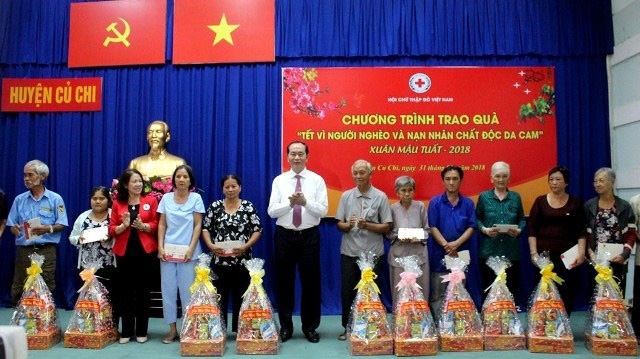


|
President Tran Dai Quang (white shirt) presents Tet gifts to local people in Cu Chi district, HCM City. (Photo: nld.com.vn) The cenotaph is the largest of its kind in Ho Chi Minh City. It
is built in the so-called Iron Triangle, famous for the historic Cu Chi
tunnels as a memorial for the people and soldiers who laid down their lives
during the resistance wars against French and US aggressors.
As a part of activities in the run up to the lunar New Year
(Tet) festival, the State leader attended a programme titled "Tet for the
poor and dioxin victims”, presenting gifts to 100 beneficiaries of State
preferential policies and low income households in Cu Chi district.
He extended his Tet wishes to locals, and spoke of his
appreciation for the efforts made by the authorities of Ho Chi Minh City and
Cu Chi district to care for policy beneficiaries, poor people, and Agent Orange/dioxin
victims.
The President expressed his gratitude for the sacrifices of
people who rendered their services to the nation, encouraging them to become
role models in abiding by the Party’s policies and the State’s laws so that
others, especially those of younger generations, can follow.
The leader also paid Tet visits to several intellectuals in the
city.
President Tran Dai Quang lays a wreath at the Ben Duoc Monument
in the Cu Chi district of HCM City. (Photo: nld.com.vn)
Source: NDO |